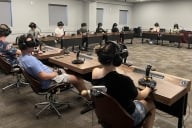You have /5 articles left.
Sign up for a free account or log in.
One of the more distinctive providers of online postsecondary education is expanding its reach -- and contemplating further changes that could increase its footprint even more.
But don't expect the Mormon Church to join Liberty University, Grand Canyon University and other institutions in trying to own the online market in faith-based higher education.
The Church of Jesus Christ of Latter-day Saints announced this month that it would expand the growing Pathway initiative -- a three-semester, blended learning bridge program operated in conjunction with Brigham Young University-Idaho -- that has helped tens of thousands of young people and adults prepare to enter degree and certificate programs at the church's universities. The LDS church sends its members on missions around the world to proselytize and provide aid, giving it a global footprint.
The new program, Pathways Worldwide, will encompass all of the online programs at LDS-affiliated institutions and is designed to "give much greater focus and impetus" to the church's "strong belief in the importance of education for all of God’s children, in their progression in life," says Kim B. Clark, former president of BYU-Idaho (and dean of Harvard Business School) and now the church's commissioner of education.
Brigham Young University, in Provo, Utah, is the LDS Church's flagship institution, but it has a small stable of others, including BYU campuses in Idaho and Hawaii, all of which have enrollment caps for brick-and-mortar programs. In 2009, BYU-Idaho, the church's most digitally ambitious institution, established Pathway, which was designed to give potential students an alternative on-ramp to an education at one of the church's postsecondary institutions.
"Be they at home here in Utah or on missions in Africa, there are many [church] members who, either because of cost or fear that they could not do the work, or other responsibilities that made it impossible to access our campuses, did not see higher education as in their reach," said Clark Gilbert, who has been president of BYU-Idaho since 2015.
Under the program, students take three semesters of a mix of academic (math and English) and study skills courses and religious education in a blended format. In addition to the cohort-based academic courses, which are offered online with university instructors, the enrollees attend in-person gatherings one night a week at one of nearly 500 sites (in 50 countries) for a mix of academic and religious instruction, led by local volunteers.
Students who maintain a B average in successfully completing the three-semester program can enroll in one of the church's campus-based or online degree or certificate programs without an ACT or SAT score -- and even without having attained a high school diploma.
"We've found that with the standard we set, waiving our normal academic requirements actually works -- Pathway students who matriculate into degree programs succeed," says Clark.
The Pathway program has charged $69 a credit hour, though prices are pegged to local economies, so the credit hour cost is about $10 in Ghana, said Gilbert. "Our intent, by charging so little and dropping entry requirements for students who complete the program, was to make the Pathway experience in the first year a real test of someone's interest in, commitment to and capacity to do higher education, period."
Expanded Pathways
About 37,000 students are enrolled in the bridge program and the various online degree and certificate programs that make up Pathway now, and the new Pathways Worldwide initiative -- which Gilbert is leaving the presidency of BYU-Idaho to head up -- will coordinate the online and in-person components of the church's existing offerings and steadily increase the degree programs it makes available online.
BYU Pathway Worldwide will not seek institutional accreditation itself, managing the bridge program and serving as a clearinghouse, coordinator and promoter of the various institutions' online credit-bearing offerings.
The expanded program will, for the moment, remain open only to members of the Mormon Church. The existing Pathway program has done modest experimentation with opening the bridge program to non-members -- letting a small number of students who did not belong to the church into a program as long as they were committed to participating in all of its elements, including the "strong religious component" it features, said Clark.
He said he expects the church to continue to expand those experiments to the point that Pathway Worldwide will eventually be open to non-members.
But while numerous Christian universities have embraced online learning with abandon to try to significantly increase their reach and revenues -- in the process sometimes raising questions about how closely they are hewing to their religious roots -- don't expect the LDS Church to follow suit, its officials say.
"Religious faith is central to the program, and we don't have large numbers of people trying to get into Pathway," said Clark. "Even if we were to open the bridge program" to non-Mormons, he said, they have to participate in the heavy dose of religious education embedded in the program.
And "once they matriculate into degree programs, they have to be endorsed by the local church leaders and we expect them to adhere to the standards of the gospel that we teach, the honor code of their university," Clark said.
When students "make the conscious choice to live that way," Gilbert said, "many of them ultimately join the church. But many do not."









